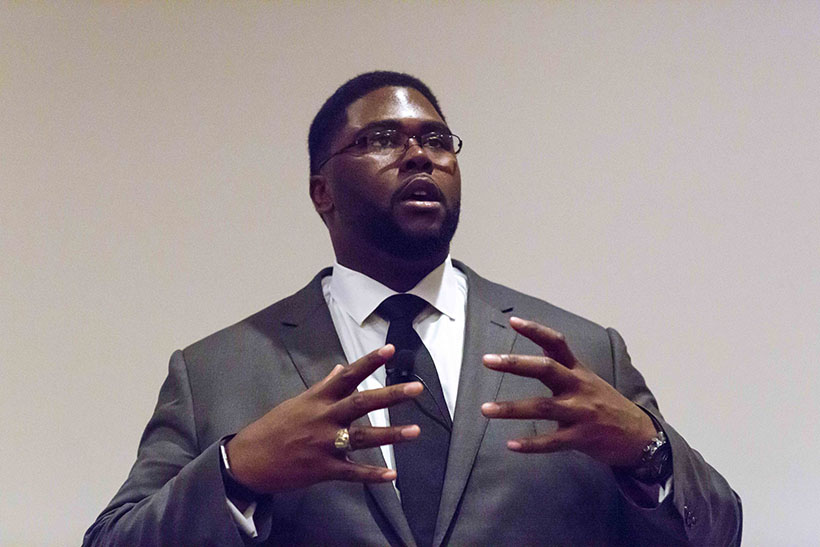
When Anthony Jack ’07 came to Amherst as a first-year from Miami, he wondered: “Where are all the other poor, black people?”
“Back home, summer was just a season; at Amherst, summer was also a verb,” said the Harvard sociologist on Dec. 1, when he addressed students, faculty and staff in Pruyne Lecture Hall.
Jack—this year’s Wade Fellow at Amherst—began by telling his own story, and then explained how it informs his research.
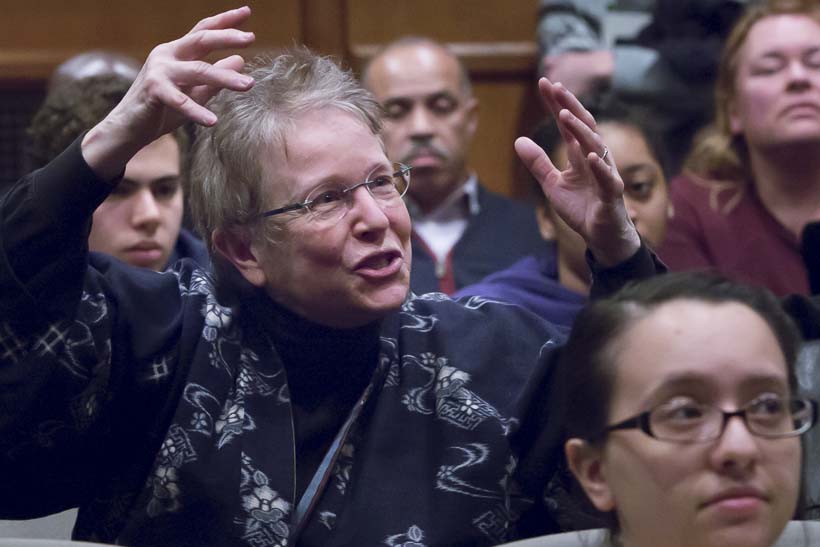
In those early days at Amherst, he said, he listened to classmates swap stories of traveling abroad and holding parties at second homes. “I resigned myself to be, yet again, the only poor, black person in a rich, white place.”
So he was surprised when a fellow student—someone who’d studied abroad in high school—mentioned that her family had trouble making ends meets. She and Jack swapped their own stories of doing homework by candlelight when the electricity was off. “We knew a common struggle all too well: that sometimes there was more month at the end of the money.”
Now a junior fellow at the Society of Fellows at Harvard, Jack studies the factors that influence undergraduates’ sense of belonging at elite colleges and their acquisition of cultural and social capital.

“When anthropologists, economists and sociologists wrote about lower-income students, they wrote of a single experience chronicling culture shock and isolation,” Jack said. “I have long grown tired of analyses comparing those from families who did and did not go to college. To overlook the rich diversity of experiences within first-generation college students is to base policy on only a partial picture.”
His research involves interviews with 103 black, white and Latino undergraduates at the pseudonymous “Renowned University,” as well as two years of ethnographic research. He divides those students into two categories: the “privileged poor,” who live in low-income, often segregated communities but enter college from elite boarding, day and preparatory schools, and the “doubly disadvantaged,” who live in similar communities but who enter college from their local public schools.

The privileged poor, he said, arrive with more cultural capital—the “taken-for-granted ways of being that are valued in a particular context.” For example, these students are often comfortable and proactive in forging relationships with professors, while the doubly disadvantaged might not know what office hours even are.
It helps all students when colleges and universities consider the varied experiences of the two groups, Jack said, pointing to an example from the university he studied: “Career, mental and support services at Renowned no longer wait for students to come to them. Rather, they developed programming where they proactively reach out.”
Jack hopes his talk will be one of many similar discussions at Amherst. “Make inclusion the guiding light,” he said in Pruyne. “For it connects to our very founding even as it becomes our future.”
About the Wade Fellowship
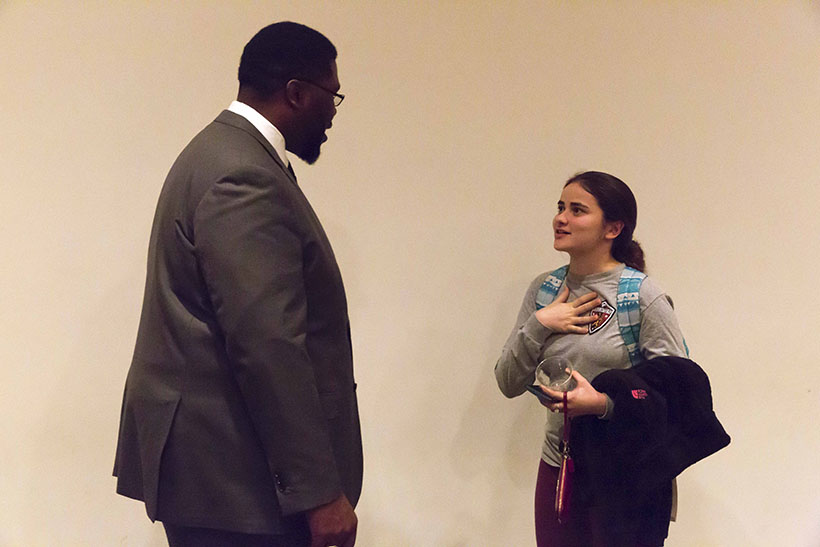
The Office of Diversity & Inclusion has reinvigorated the Wade Fellowship, a decades-long platform at the Amherst for recognizing black alumni achievement and connecting black alumni with students for career mentorship and discussions on campus.
The Wade Fellows Programs was established in 1976 in honor of Harold Wade Jr. ’68. While a student, Wade worked to strengthen the black community at Amherst, including organizing the Afro-American Society and initiating recruitment materials aimed at attracting black high school students to Amherst. His book, Black Men of Amherst, was published posthumously by the College and is an important work that documents the achievements of many black Amherst graduates.
The Harold Wade Jr. Memorial Fund Fellowship is designed to supplement the College’s career counseling by bringing back one or two black graduates each year to meet with all students. The returning fellows are from all walks of life and all age groups, and they share their Amherst and post-Amherst experiences with student through participation in classes, informational meetings and lectures.
About Anthony Jack ’07
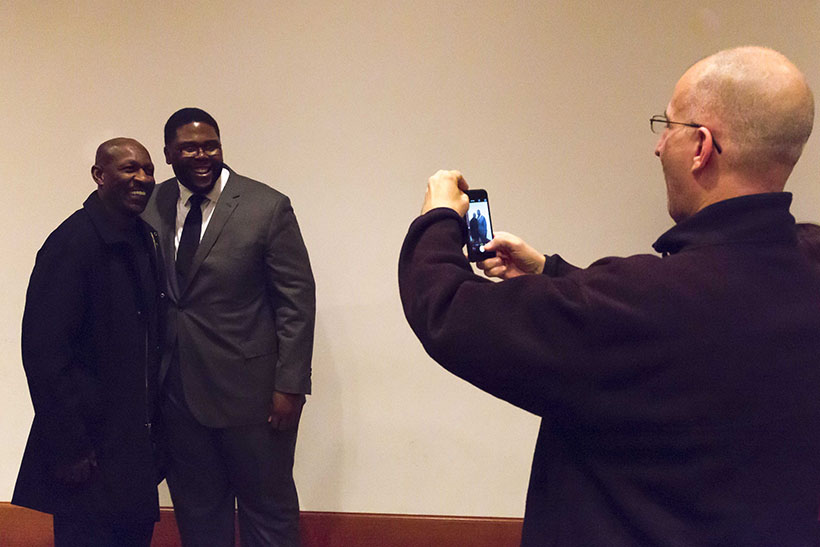
Jack, a Junior Fellow at the Society of Fellows at Harvard University, focuses his work on what influences undergraduates’ sense of belonging at elite colleges and their acquisition of cultural and social capital. When his fellowship concludes, Jack will fill the role of assistant professor of education at the Harvard Graduate School of Education and the Shutzer Assistant Professorship at the Radcliffe Institute of Advanced Study. Jack’s work appears in the Du Bois Review, Sociological Forum and Sociology of Education. Additionally, The New York Times, The Boston Globe, The Washington Post, The Huffington Post, American RadioWorks, National Review and Minnesota Public Radio have featured his research on lower-income college students as well as biographical profiles of his experiences of being a first-generation college student.
Jack received his B.A. in women’s and gender studies and religion (cum laude) from Amherst in 2007 and his Ph.D. in sociology from Harvard in 2016. He holds fellowships from the Ford Foundation and the National Science Foundation, and is a 2015 National Academy of Education/Spencer Foundation Dissertation Fellow.
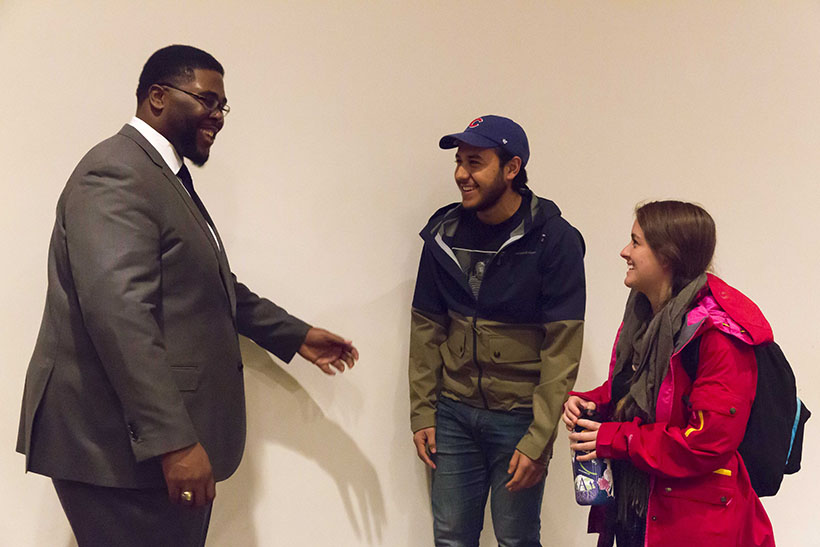
Past Wade Fellows
2013–14 Kim Wyche-Etheridge M.D. ’87, Frank Thompson ’87
2011–13 Marissa E. Horne ’00, Matthew M. Murumba ’04
2008–11 Stanley Francois-Calhoun ’94, Nicole D. Scott ’97
2006–08 Kimberlyn R. Leary ’82, L’Quentus Thomas ’97
2000–02 A Pierre Jackson ’78, Kimberlee Wyche-Etheridge ’87
1998–99 Yvette Mendez ’84
1996–98 Susan Prattis ’80
1990–92 Richard V. Sims ’70, Cheryl Singleton ’81
1988–89 Kellie Jones ’81
1984–85 L. Robert Bolling ’82
1982–84 Cuthbert (Tuffy) Simpkins II ’69
1981–82 Wayne M. Wormley ’72
1980–81 Hugh B. Price ’63
1979–80 Junius Williams ’65
1977–78 Guichard Parris ’27